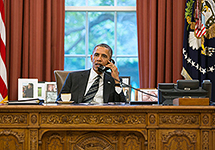
President Obama on phone with
Iranian President, Hassan Rouhani, WikiMedia Commons
Jon B. Wolfsthal
October 4, 2013
One of the things we learn as kids when we first play sports or go to the ball game is don’t root for failure (Ok, I grew up in New York where it was Ok to boo the umpire, but that is a different story). Alex Rodriguez was reminded that it is bad form to yell “ha” when the fielder is trying to make a catch, and fans at any tennis match know it’s not too classy to clap when a tennis player makes an unforced error. You root for your team to win, but it is poor form to root for your opponent to lose.
I guess a lot of people working the Iran problem have never played sports because there is a whole lot of rooting for failure going on. I am not talking about skeptics. Anyone, heck, everyone should be skeptical of Iran’s willingness to change course and constrain its nuclear activities. We’ve been working this problem for about 30 years and it has not yet worked out quite right. In fact, President Obama himself – the guy who called President Rouhani – has said he is skeptical. But if given a chance at a peaceful negotiated settlement to the Iran’s violations of pretty much every nuclear nonproliferation norm, then the United States has a responsibility to pursue it. Secretary Kerry said it would be malpractice not to try. With open eyes, with no illusions, the Obama Administration is trying to test the premise that our long-term strategy of applying sanctions to change the calculus of Iran’s leaders is working. Let’s recall that for the centrists who have been running most of American’s foreign policy since the 1980s (with the exceptions of the regime changers in the Bush Administration) the goal of American sanctions has been to make Iran’s leaders feel enough pressure that they end their nuclear weapon ambitions. This might be what a yes looks like.
Now perhaps some experts expected the sanctions strategy to result in Iran one day packing up their nuclear materials and equipment and just sending it to the United States for safe keeping. I suspect, however, that most pragmatists realized that there would be a series of negotiations between American and Iranian officials to work out the details. Well, guess what – Iranians and American officials are starting to talk. No results yet after two weeks true, but after 34 years of no contact, it might reasonably take more time than I took on my honeymoon to see whether a deal is possible.
There is no question this will be a complex and sensitive set of talks. More likely than not, they won’t succeed quickly, if at all. American negotiators, including Secretary of State John Kerry, need to push for a deal that provides confidence and transparency over Iran’s ensure nuclear operation and provides real constraints on Iran’s future ability to pursue nuclear weapons. And yes, there will risks that those seeking a deal, any deal, might try to settle things in a way that does not really head off Iran’s nuclear capabilities. In this case, there are some deals that are worse than no deal at all.
Into this complex mix of people working to see if a negotiated solution is possible are a whole lot of “you’re being duped” guys and gals. Moving beyond the “be careful, this might be a trap” – something we need to be concerned about – are leaders and outside experts pushing their own narratives that not only are the talks doomed to fail (they may be) but there is no chance Iran is serous about talks, constraints, or cooperation. None. Zilch. Nada.
Leading this charge is Israel’s Prime Minister Benjamin Netanyahu. His “wolf in sheep’s clothing” statements at the United Nations may prove true, but they also expose a narrative that in his mind means there is no possible way Iran’s President or the Supreme Leader are serious about changing the course of their nuclear program. Impossible. Can. Never. Happen.
Well, even if they are right it seems to me that he and a few others notables seem a little too anxious for the effort to fail. Some in Congress and even some former Government officials also appear a little too eager for this latest flirtation to end badly so they can get on with … it remains what? More sanctions to be sure, but probably some variation of military strikes (yet to be shown as effective) or a regime change (good luck selling that one again).
If the crisis caused by Syria’s use of chemical weapons has shown anything, it is that the American people are not eager to launch another military effort anywhere, even for the cause of nonproliferation. That doesn’t mean the President might not have to consider such options in Iran. But it does mean that the Government has to show that we have seriously tested any and all viable diplomatic options.
Naysayers will have plenty of time to gloat later if they are right. But I for one will be keeping a list of those who were rooting for these efforts to fail and be lined up asking what their next best option might be. Or maybe we can ask them that now and see if that flies.
